There is an ever-growing population of people living out of their vehicles. Some vehicle dwellers are full-timers, while others are just taking a road-trip or camping off the beaten path. But there is a wide variety of vehicles that can serve the purpose. Here’s a breakdown of all the best vehicles to live in.
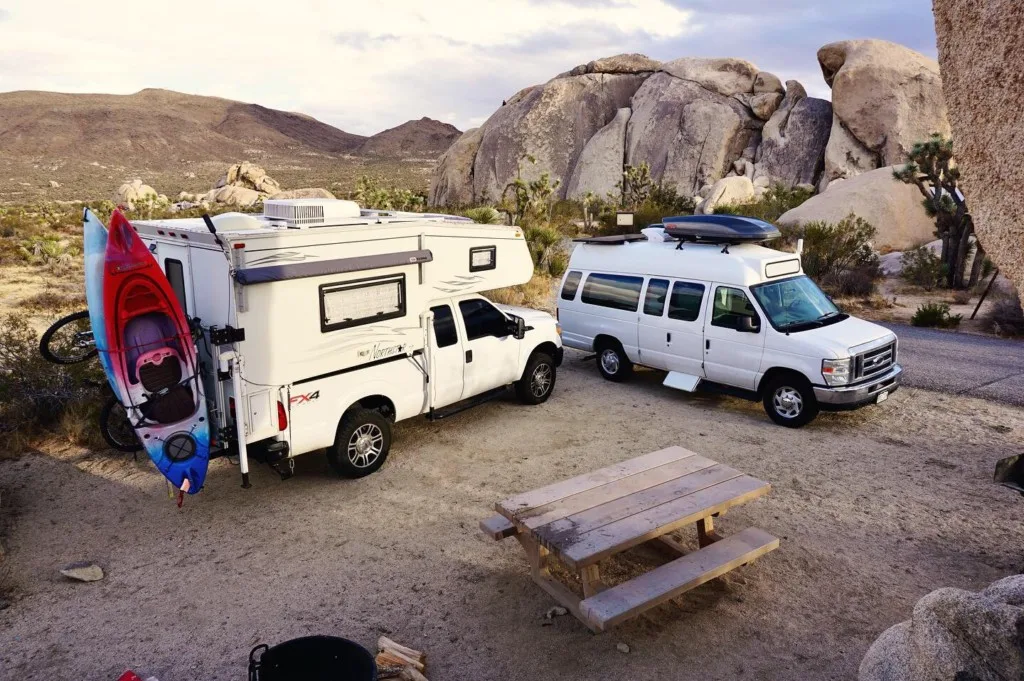
Living in a vehicle can save you money on hotel rooms, save you from having to tent camp, or even replace your rent payment if you choose to go full-time. There are many factors to consider, like what amenities you need, the size of your vehicle, and where you want to go. Let’s jump in.
Table Of Contents
- RV’s (Recreational Vehicle)
- Campervans
- Truck Campers
- Skoolies (School Bus)
- Minivans
- Truck Bed Shell
- SUV’s + Hatchbacks
- Sedans
RV’s (Recreational Vehicles)
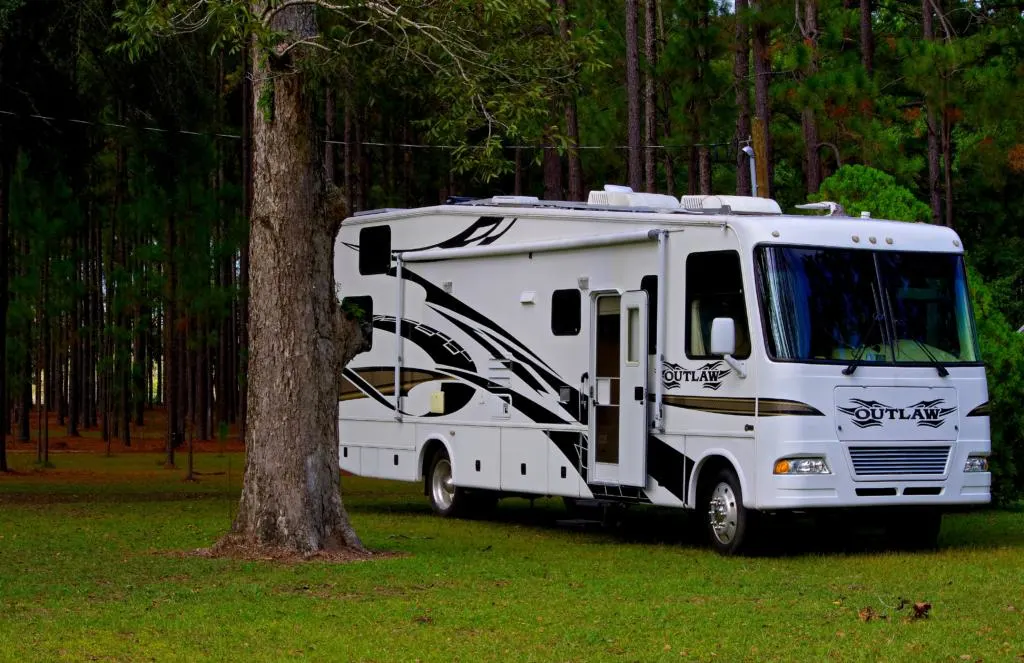
Recreational Vehicles will probably always be at the top of the list of “best vehicles to live in.” Their size and ample comforts make them a top option.
I am going to group travel trailers and fifth-wheels in the RV category. They are similar in many ways (size, layouts, amenities) but they just don’t have their own engine. So they’re usually cheaper than RV’s but don’t forget to factor in the cost of a vehicle to tow it.
Pros of RV’s
- There are so many types of RV’s available. And they have been specifically perfected for decades to provide the most comfortable home on wheels. They will be by far the most similar to living in a regular home (i.e. separate rooms, full-size beds, a true bathroom and shower, etc.)
- While their size can vary greatly, RV’s generally offer the most space of all the best vehicles to live in. They have ample space allows for endless layouts to accommodate family, pets, and personal belongings. Some large RV’s can even sleep up to 8 people.
- RV’s usually have access to unlimited resources with water, sewage, and electrical hookups (when at campground’s with hookups).
- And beyond that, they can carry the most resources. So they can go off-grid for the longest periods of time. The can help you live off-grid for long periods of time with large water tanks, big battery banks, sewage holding tanks, and ample storage for food and supplies.
Cons of RV’s
- RV’s are expensive to buy and maintain. The up-front cost of an RV is generally the highest on the list because of their size and amenities.
- Terrible fuel economy. Some of the largest RV’s get 6-8mpg.
- Repairs are expensive. More amenities means more things that can break, and unless you are really handy, be prepared to pay niche RV mechanics for high labor bills.
- RV’s have poor maneuverability. Finding parking, changing lanes, or navigating tight city streets can be very challenging in an RV. And their height may prevent you from accessing drive-thrus, parking garages, etc.
- RV’s are nearly always 2WD, so that will also limit the mobility off-road and in snowy conditions.
- The engine and the living area are inseparable, so if the vehicle’s engine starts to break down, you may need to move on entirely.
- Storing your RV can be costly (if you aren’t a full-timer).
Campervans
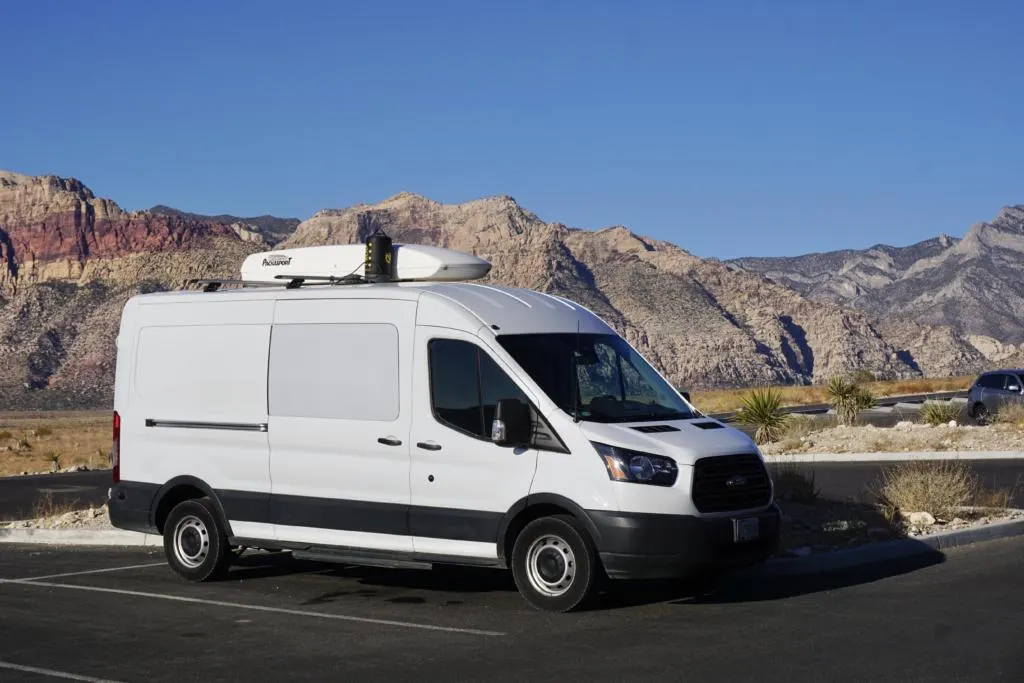
The modern campervan has catapulted to among the most desirable vehicles to live in. Technological advances have allowed most of the comforts of an RV to fit into a much smaller and easier to manage package. Vans are often viewed as an ideal balance of size and comfort.
Pros of Campervans
- Vans can have many of the features and amenities of an RV. The interior cargo space of larger vans leaves room for a reasonably comfortable living space, with a bed or dinette, fridge, stove, and sometimes a bathroom.
- Compared to similar RV’s, they are less expensive to buy. And if you convert a campervan yourself, they can be much, much cheaper.
- Depending on the size and brand of the van, their maintenance costs can be pretty close to owning a passenger car.
- They can do some stealth camping, some less than others depending on the specific conversion. But still always better than RV’s, Skoolie’s, and Truck Campers.
- And they drive relatively similar to a truck or large passenger car. That is, they can reasonably navigate city streets, fit into normal parking spots, and handle more rugged dirt roads (especially if you spend up for 4×4).
Cons of Campervans
- They rarely have more than one “room”. So if you’re sharing the vehicle with someone else, there probably isn’t any privacy.
- If there is a shower or bathroom, it’s probably just barely big enough to fit one person.
- They are probably missing or have an abbreviated version of some comforts that you are used to. They often don’t have an oven, shower, toilet, or closet.
- To save space, most campervans have smaller than normal beds. Either some portion has been cut off to fit into the specific van, and/or the mattress is less than 8 inches thick to save space.
- All low-roof campervans aren’t tall enough to stand up in.
- They can’t carry as much resources as an RV. There are usually smaller water tanks, smaller battery banks, and small or non-existent black and grey water storage.
- They often don’t have hookups for water, electricity, and sewage. So if you like to be connected at campgrounds, then be sure that your campervan has hookups.
- The engine and the living area are inseparable, so if the vehicle’s engine starts to break down, you may choose to move on entirely.
Truck Campers

A Truck Camper is a hard-sided camper that is designed to slot right into a pick-up truck bed. They are a great option for serious overlanders that still want many of the comforts of an RV or campervan.
Pros of Truck Campers
- If you already own a suitable truck, then truck campers are a quick “plug and play” option. The camper secures right onto the truck bed and you’re pretty much ready to go.
- Pickup trucks are generally very reliable vehicles that can handle heavy use. And they are easy to find parts and mechanics.
- And if your pickup truck starts to break down, you can easily swap out to a new truck. Just transfer the camper to your new truck, and you’re ready to go.
- Truck Campers usually come completely ready to move in with standard RV-type amenities (fridge, stove, bed, dinette, etc.).
- They can be significantly cheaper than a campervan or RV. But of course, you need to factor in the cost of your pickup truck, which typically needs to be a heavy-duty one-ton pickup (Ford F-250, F-350, Chevy 2500, 3500, etc.)
- They are the most capable setup for dirt roads and off-roading. If having 4×4 is a MUST, then a truck camper might be your best bet. Pickup trucks have by far the most 4WD’s available.
- They are easy to maneuver because the length is about the same as whatever truck they are mounted on. There’s no trailer, or extra-long back end to worry about.
- You can remove the truck camper and then you take your truck to go into town. And the camper can hold your campsite for you. Or if you go back and forth between travel and “regular life”, the pickup truck can serve as a somewhat reasonable daily-driver. (RV’s and Campervans are bad daily-drivers)
Cons of Truck Campers
- Truck campers can have pretty terrible fuel economy hovering around 10mpg.
- While truck campers can be removed from the truck, if it’s just for a short trip, most people will find it’s not worth the hassle.
- The camper door is usually about 3 feet off the ground, requiring folding stairs to easily go in and out.
- You cannot go from the cab of the truck into the camper without going out and around. This makes going between driving and “living” a bit more of a cumbersome. And it can be a safety issue if you’re in the camper and need to suddenly drive away from a threat.
- They are made of cheap materials (the manufacturer would probably spin it as “Lightweight Construction”). But just be ready for some things to fall apart and need repair over time.
- Water damage is a common problem. So check for signs or water, and be prepared to redo the seals often.
Skoolies (School Bus)

School Buses are growing in popularity as good vehicles to live in. People are discovering that they are easy to find in good condition used. And they offer ample room and are built on reliable engines.
If you are interested in buying a Skoolie, this website is a good resource.
Pros of Skoolies
- They have tons of interior space that make for the perfect blank canvas for custom conversions.
- The interior height is usually 6 feet at the center, with rounded corners. But there are also taller heights available up to 6’6”. And the interior length of a normal bus is between 30-36 feet. And a short bus is probably only around 13 feet of interior build space.
- But Skoolies no matter the length usually have an interior width of 7’6”. This is much better than a narrow campervan (usually between 5’10” and 6’4” at best). An extra foot might not seem like much, but when multiplied over the length of the vehicle, can actually add up to a lot more space. And it also allows for width-wise bed orientations, which generally save lots more space for the rest of your conversion.
- Skoolies are cheap to buy, considering the size.
- Skoolies are well-maintained because they are part of a school fleet that usually needs to adhere to laws and regulations.
- Lots of short skoolies are based on common Ford and GM vans, so they share those common engines and the benefits of abundant parts and a wide variety of mechanics that can work on them.
- Regular Skoolies often have diesel engines that are incredibly reliable and can last well over 350k miles. Gas engines tend to fall apart around 300k miles.
Cons of Skoolies
- Regular skoolies get bad fuel economy.
- They can be more expensive to maintain because of their size: for example tires.
- They are difficult to drive and park because of their size.
- They have soooo many windows, which makes insulation and privacy a pain.
Minivans
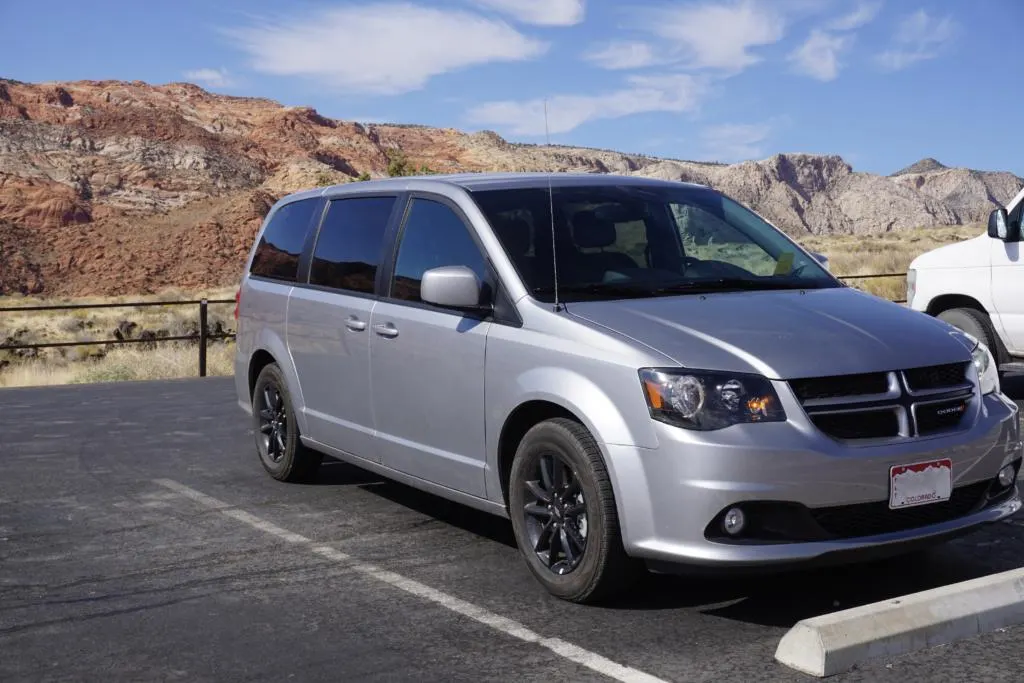
Minivans are great if you’re looking at smaller, easier to drive vehicles to live in. But they still can have a decent cargo room.
Pros of Minivans
- They are widely available, so plenty of cheap used options exist.
- They handle like a car, so nearly anyone can be comfortable driving them.
- They get good MPG, and are a suitable daily driver.
- They are cheap to maintain.
- There are some AWD options (Toyota Sienna, Chrysler Pacifica, Chevy Astro, GMC Safari)
- They often have folding or removable seats to create a completely flat floor.
Cons of Minivans
- They are quite small and can usually only fit a small conversion.
- For sleeping one person, you can fit a single bed plus some storage, a fridge or cooler, and maybe a small counter/desk.
- For sleeping two people, the bed will take up nearly the entire floor space, so storage will have to be built below the bed or hanging. And a fridge/cooler may only fit up front between the front seats.
- No minivans are tall enough for standing.
- Their low clearance and smaller tires aren’t ideal for off-roading.
- Nearly all minivans have lots of windows, which makes insulation more challenging.
Smaller Options of Vehicles to Live in
This pretty much ends the list of vehicles to live in that can accommodate some semblance of a living area. But it is possible to live in smaller vehicles, but just don’t expect to fit more than a bed and a little storage inside. None will offer standing height and some may even be too short to sit up inside. But that doesn’t mean that they’re not great options for certain people and situations.
They are generally fine vehicles to live in for short periods of time. But most people will find them insufficient for long-term living. But the possibility of using a vehicle that you already own makes it a great option for road trips, camping, or other short term situations.
Conversions for smaller vehicles usually take advantage of outdoor space in a few key ways. One example is having a kitchenette that slides out of the trunk. Or using some kind of awning, tent, or canopy to expand your “living” space. And lastly making use of the best external storage options, like cargo boxes, hitches, and roof racks.
Truck Bed Shell / Canopy
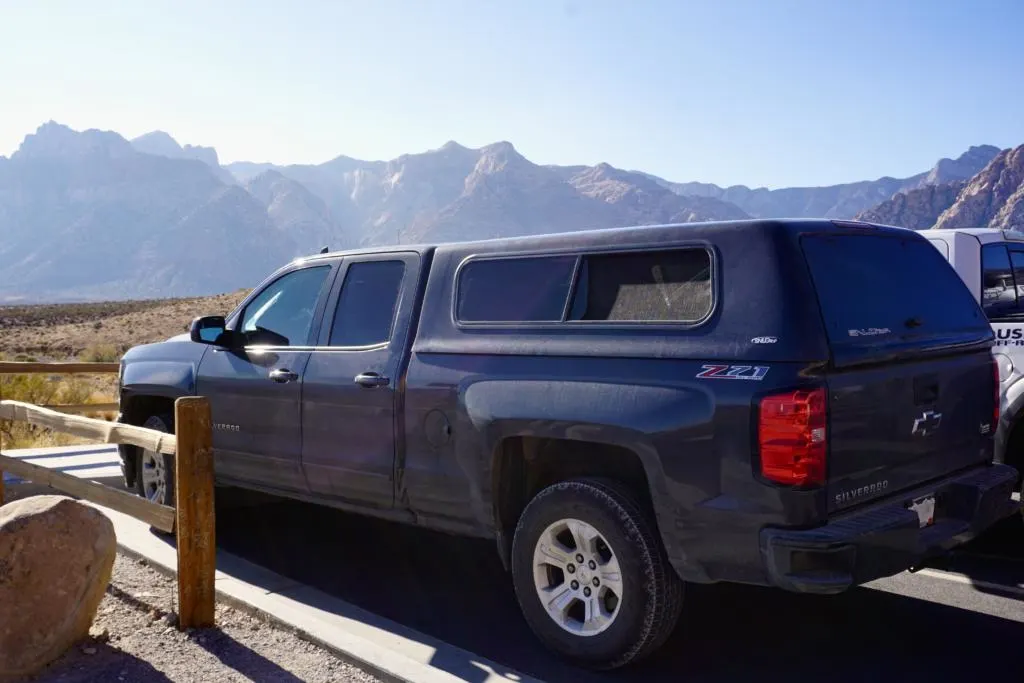
A pickup truck with a hard-shell (aka canopy or topper) is a popular smaller option of vehicles to live in. But just keep in mind that you need to have a truck bed long enough to fit your body lying down.
Pros of Truck Bed Shells
- Trucks are by far the most abundant 4×4 vehicles. So they make great options for people who need the most capable off-roading rig.
- Most towing capacity.
- Much more maneuverable than RV’s and Skoolies.
- Easy to find parts and mechanics
Cons of Truck Bed Shells
- Short interior height may feel “coffin-like”.
- Thin materials and limited space makes insulating very challenging.
- Climbing in and out of the truck bed can be difficult.
- Some of them don’t have a pass-through window to go from the cab into the topper.
For a detailed guide about choosing a truck shell: read this. https://www.takethetruck.com/blog/truck-canopy
SUV’s & Hatchbacks
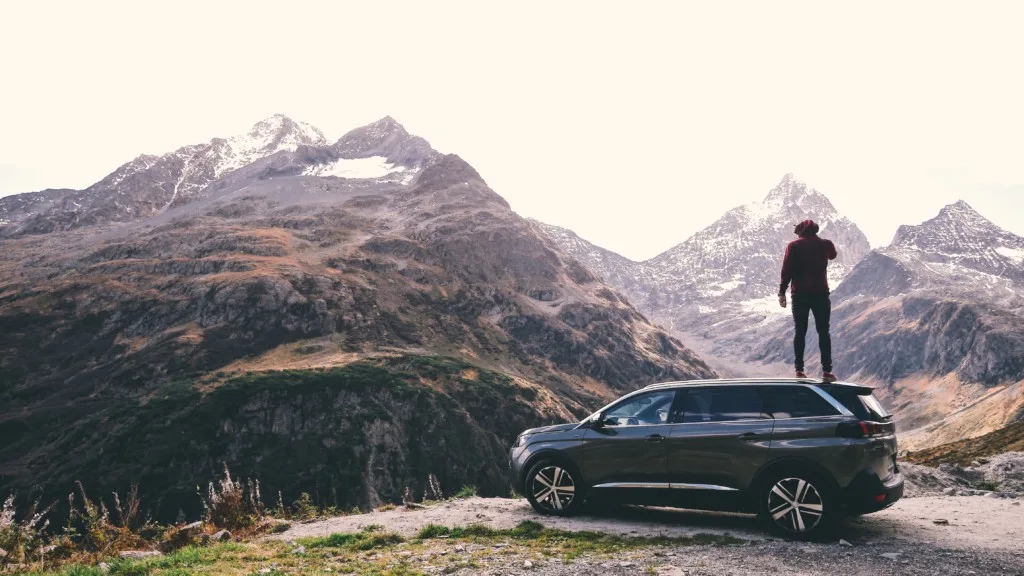
Sport Utility Vehicles (SUV’s) and Hatchbacks are another great smaller option of vehicles to live in.
Pros of SUV’s and Hatchbacks
- They are a popular option for their combination of size and ability.
- They get great gas mileage (compared to the rest of the list)
- They make a good daily driver.
- They are common in 4×4 and AWD.
- Certain 4×4 SUV’s can be just as capable off-road as trucks. (Some even more so with their short wheel-base and incredible approach angles)
Cons of SUV’s and Hatchbacks
- The interior space doesn’t leave much room for anything more than a small bed and some storage.
- The rear seats may not be removable, or may create awkward space when folded down.
- Some smaller SUV’s and hatchbacks have low clearance and smaller tires, hurting off-road performance
Sedans
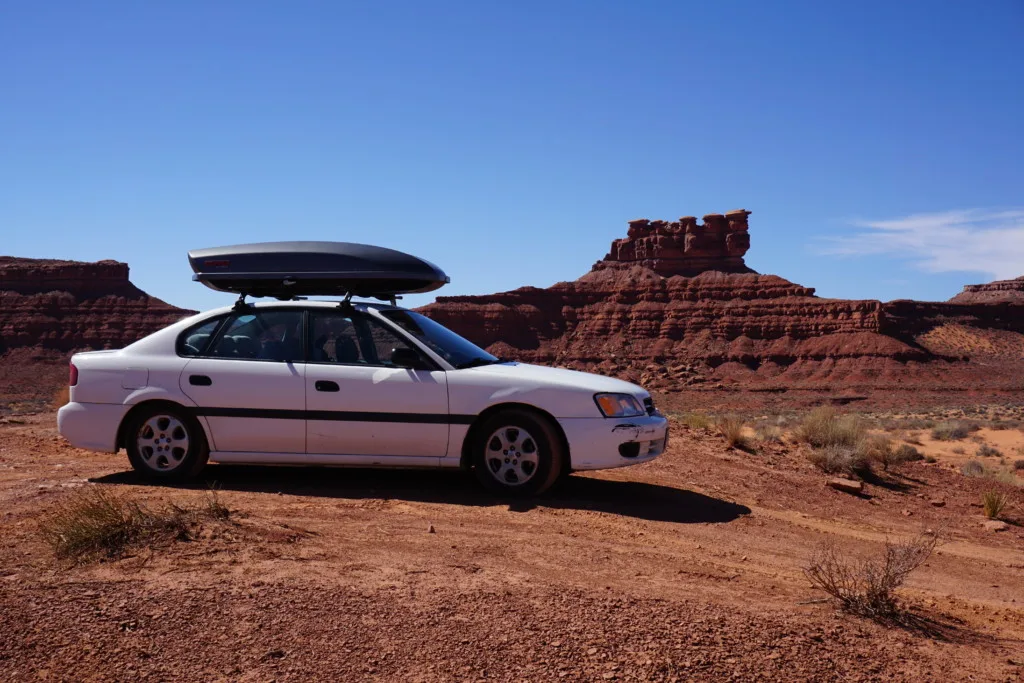
Sedans are not usually the first thing that comes to mind when researching the best vehicles to live in. But for those ballin on a budget, you can make it work
I know from experience. Emily and I used to both sleep in my Subaru Legacy for camping trips. And most recently, we traveled across the country in a rental Nissan Sentra sedan.
The key to making sedans suitable vehicles to live in is folding or removing seats. With these methods, you can create enough space for a sleeping area. The two most popular methods are back seats that can fold down and create a continuous platform with the trunk. Or the other common method is to recline the front seats all the way down to form a continuous platform with the rear seats.
Pros of Sedans
- Excellent gas mileage.
- Cheap to buy and maintain.
- Can fit or drive anywhere (that’s paved).
Cons of Sedans
- Tiny amount of space for a conversion and personal belongings.
- Not great for off-roading.
- Hard to insulate.
If you don’t believe me about sedan conversions, check this entire subreddit devoted to Toyota Prius Dwellers.
Takeaway: Best Vehicles To Live In
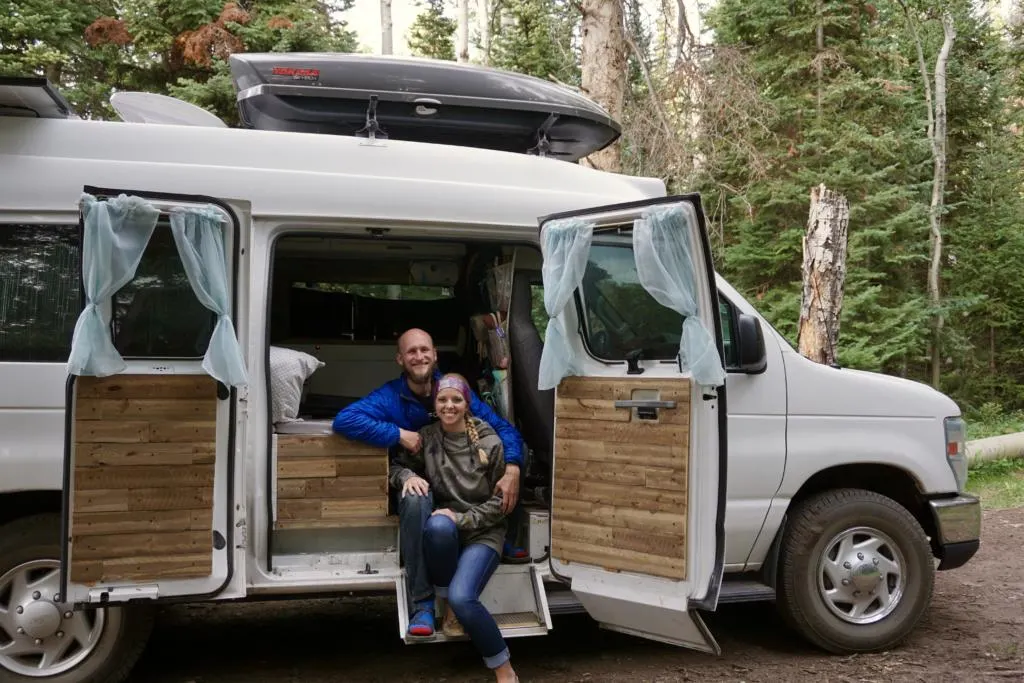
This list of the best vehicles to live in gives a brief overview of the pros and cons of each vehicle type. We are obviously biased towards campervans, but that doesn’t mean we don’t find ourself jealous of people living in other types of vehicles. For example: every time we pump gas .
And car camping in my old Subaru sedan is practically what started this entire website, so don’t worry if you can’t afford one of the nicer vehicles to live in. Just make do with what you can, and get out there!
There’s a good vehicle for every kind of budget. Whether you plan to move into a vehicle full-time to embrace the nomadic life, or you have fallen on tough times and need to move into your car for a couple months to get back on your feet.
Did I miss any of the best vehicles to live in? Let me know in the comments.
If you end up living in a smaller vehicle, be sure to read my Car Camping 101: Guide To Sleeping In Your Car.
Save The ‘Best Vehicles To Live In’ For Later
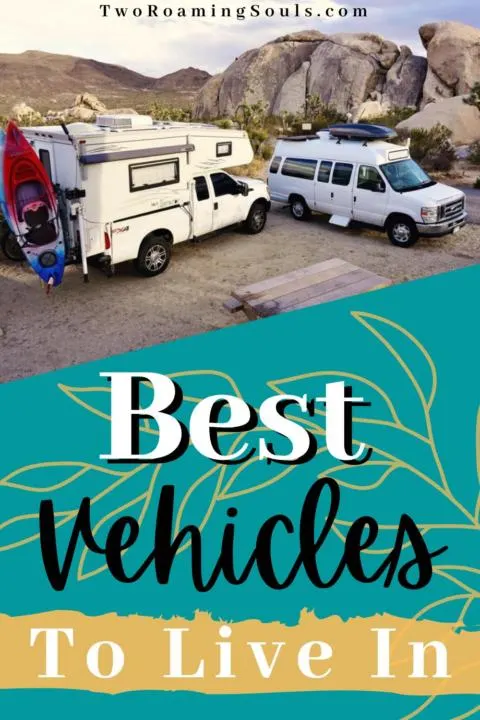

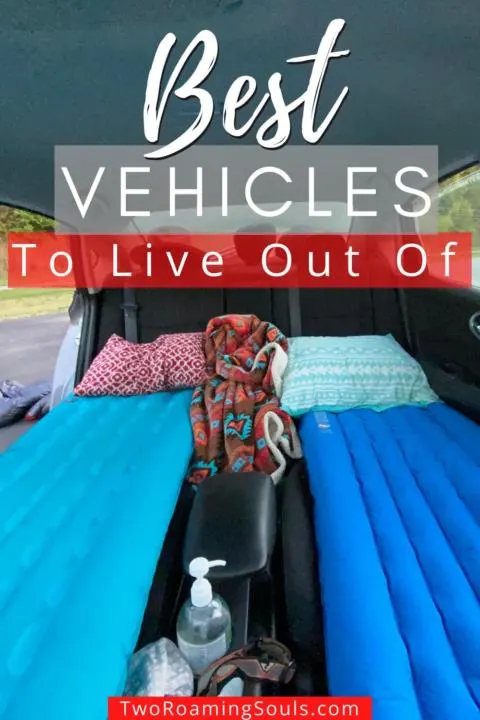

Tips On How To Save Money Booking A Rental Car - tworoamingsouls
Friday 22nd of January 2021
[…] What Are The Best Vehicles To Sleep In […]